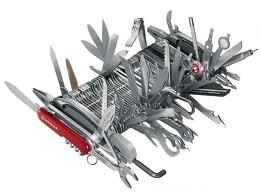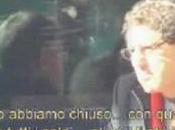 (versione italiana qui).
(versione italiana qui).If you think that Switzerland is a world of violet cows, cuckoo clocks, cheese with holes and that the Swiss citizens are precise, tidy and clean, well, it is all true. But there's also a hidden, invisible as palpable dimension that separates the non-Swiss from the Swiss ones. You can make guesses based on the observations gathered during the chances of meetings between these two worlds: at train station, at the supermarket, at restaurants...no foreigner knows with proves of certainty what's inside the heads and inside the homes of the Helvetian people.
The Swiss play by the rules and schedules that they are given: the taxes are paid, the queues are respected and the train always starts at 3:03 from platform 7, 365 days a year. They make, use and keep running a number of facilities to ease many practical operations: the playgrounds are clean, the trams have dedicated admission doors for adults with stroller, the train stations has an access ramp to the track made of simple inclined cement, so everyone can push up and down suitcases, strollers and everything on wheels. But if they have to do a spontaneous act directed to the benefit of others which is not indicated by a rule, it won't happen more often than in any other part of the world. In fact, even a bit less often: they seem to be blindly immersed in another world, perhaps, in fact, that dimension of Switzerland that is invisible to the rest of us.
In their dimension, the Swiss people can choose between two supermarket chains: Migros and Coop. Both chains offer a system of loyalty programs with such ridiculous terms that to get a teaspoon as a gift you should spend at least 5,000 francs: the loyalty program provided by the Italian chain Esselunga would be considered porn consumerism here. Such loyalty scrooge programs mean that the Swiss people stick to buy either in Migros or in Coop.The non Swiss ones don't feel loyal to any of the two because they have already given up the idea of spending thousands of francs to get a saucer of Richard Ginori and they even go to the store across the border, motivated by the awareness that it is not normal to pay the chicken twenty francs per kg. From the standpoint of the expat consumer, Coop triumphs currently above Migros because:- Migros does not sell alcohol and if you take away from the expat people even the wine, there is not much left to give a lively touch to a typical Swiss evening.- Coop, besides the usual fashion for international cuisines (Thai, Sushi, Mexican) also provides those little foreign things that all expat sooner or later decide that they really need it, even if they cost 4 times more than in their country : for the Germans there are the frankfurter, for the English the Colman's mint sauce and the marmite , for the Italians the Saccottini snacks of Mulino Bianco and the fake Fiesta snack (which is called MixMax, made by the Balconi company).However, Migros sells an infinite series of irresistible yogurts for sixty cents of francs (yogurt is probably the only food with a normal price in the entire Swiss Confederation): choco, mocha, lemon, rhubarb, blueberry, mango, pineapple, applepie, caramel, toffee, peach, raspberry, nougat, etc. etc. and when I was pregnant I appreciated the availability of the San Pellegrino Bitter and the Chinotto Lurisia.
In Switzerland far disproportionate amount of money are paid for restaurant dinners of a level that anyone could prepare equally in their own kitchen. How do these deadly expensive restaurants not only survive, but they are even so packed that you need to book to go eat half a chicken with fries (just sixteen francs eh)? Is that the customers are always and only non-Swiss, resigned to get financially ripped off cyclically to go eat out sometimes? Also, what do the Swiss people do in the evening is not really clear. The lights go out around 8 in the countryside and an hour later in the city. Very few non-Swiss have had the opportunity to be invited to the home of Swiss and everyone I know who had such a chance share my same feedback: expensive homes, custom furniture, on the table just bread and cheese fondue, if you are really lucky you also get a cream brule'e of Migros for dessert, at nine o'clock all the dishes are in the dishwasher and you are kindly laid off at half past nine. Leaving the non Swiss forever in doubt whether the Swiss are stingy with their guests or they eat bread and fondue every night and that's how they have become rich, or they eat bread and fondue at home to be able to afford a twenty-two francs Mojto that special time in a while that they feel brave and they go out.
What the Swiss people do over the weekend is even more mysterious: shops close on Saturday at sixoclocknotasecondlater and everything falls in the almost total silence, just broken by the Italian restaurants full of expats that offer, for a high price, a little of noise.
The dark side of the Helvetia spread up definitely in the activities of the security forces. I am not referring to the Swiss Guards of the Pope, but to the police of Cheese and Meat. Of many legendary stories of hardship endured by living in Switzerland heard by non-Swiss, this is for sure the most painful, especially for the Italian immigrants. It seems that until the entrance of the Confederation in the Schengen system in Switzerland it was prohibited to import more than half a kilogram of cheese and more than half a kg of meat per person, as well as the typical restrictions on liquor in the world pre-Schengen (How many liters of Limoncello made from grandma were seized in the past!). Because of this, there are plenty of tales of emigrants returning from visits to Italy or their relatives coming to visit them, about crossing the border with sausages wrapped in socks, pieces of cheese hidden in shoes and any other subterfuge, in case the police of the cheese or meat would have caught you. It seems that the Policeman of the cheese had no jurisdiction to check the meat and vice versa. It seems that the Italians living in Switzerland who used to go the store across the border in France or Germany to avoid paying the famous chicken twenty euros per kilo, they used to lend each other the children in order to have more heads in the car to justify the cost of importing a 2kg t-bone stake or a box of mozzarella. Although Switzerland is now part of Schengen and has therefore loose the rules about introducing some food from the EU, these quantities and limits are still existing:
Prodotto Maximum Quantity exempt from tax per person per day, provided they fall within the exemption according to the value of CHF 300 .-- Duty rates in fr. for any excess quantities for l/kg5
Butter and cream (including coffee cream, half cream, sour cream or cream sauces, with a milk fat content exceeding 15%) max 1 l/kg 16.-
Milk and other milk-based products (without cheese and dairy products) max 5 l/kg 3.-
Eggs 2,5 kg 3.70
Vegetables 20 kg per type 3.70
Apples, pears, quinces, plums, sloes, Claudie plums, prune plums, apricots, cherries, strawberries, raspberries, Currants, blackberries and cassis 20 kg per type 3.50
A) Meat and edible offal of beef, veal, pork, sheep, goat, horse, mule or hinny, fresh, chilled or frozen.Warning: The spicy meat, marinade, or slightly roasted breadcrumbs belongs to this group. max 0,5 kg 20.-
B) Meat and edible offal of animals mentioned in the letter, salt (preservation), dried or smoked;
Meat and edible offal of poultry of all kinds;
Sausages and similar products of meat, meat offal or blood;
Preparations or preserved meat of animals mentioned in the letter and poultry max 3,5 kg 13.-
Cereals and milling products 20 kg per type 1.50
Products made with potatoes (pommes chips, potato chips, french fries etc..) 2,5 kg 7.50
Oils, fats and margarines max 4 l/kg 2.10
Juice of apples, pears and grapes, apple cider and perry max 3 l -.90
Be careful, however :
The products of animal origin from the EU and Norway for private use(not to be offered for sale) may be imported without control by the border veterinary.(I would love to interview a boarder veterinary) The import of goods of animal origin from third countries is in principle prohibited.
But you can carry with you for private use the following products:
Up to 20 kg per person: eviscerated fish, shellfish and other fishery products dead. It is permitted to carry even a single fish weighing over 20 kg (So you can bring a shark in your trunk)
From Iceland and the Faroe Islands may bring a quantity of fishery products equal to that which can consume you and your family. (So how much fish Iceland people consume normally? )Up to 10 kg per person: all food and food for pets coming from Croatia, Faroe Islands, Greenland and Iceland.
Up to 2 kg per person / animal:
- Honey
- Alive bivalve molluscs, snails (Is that a discrimination to the French community?)
- Milk powder for infants, infant formulas, medical foods and special foods veterinarians, provided that it is still packaged branded products that should not be refrigerated. (So you can get an indigestion of snails but your baby can have formula milk just for 2 weeks)
Unlimited quantity: baked goods without meat and without chocolate. (which means you can bring just 20 kg of croissants with chocolate but tons of those with jam?)
but above all, if you pass by Switzerland, remember that
The import of meat and meat products of turtle and sturgeon is prohibited from all countries. In the tourist traffic, a tolerance exists for caviar import of 125 grams per person per day.
Just to save the travel snack of the Russians who come to Geneva to buy a Rolex :-D





